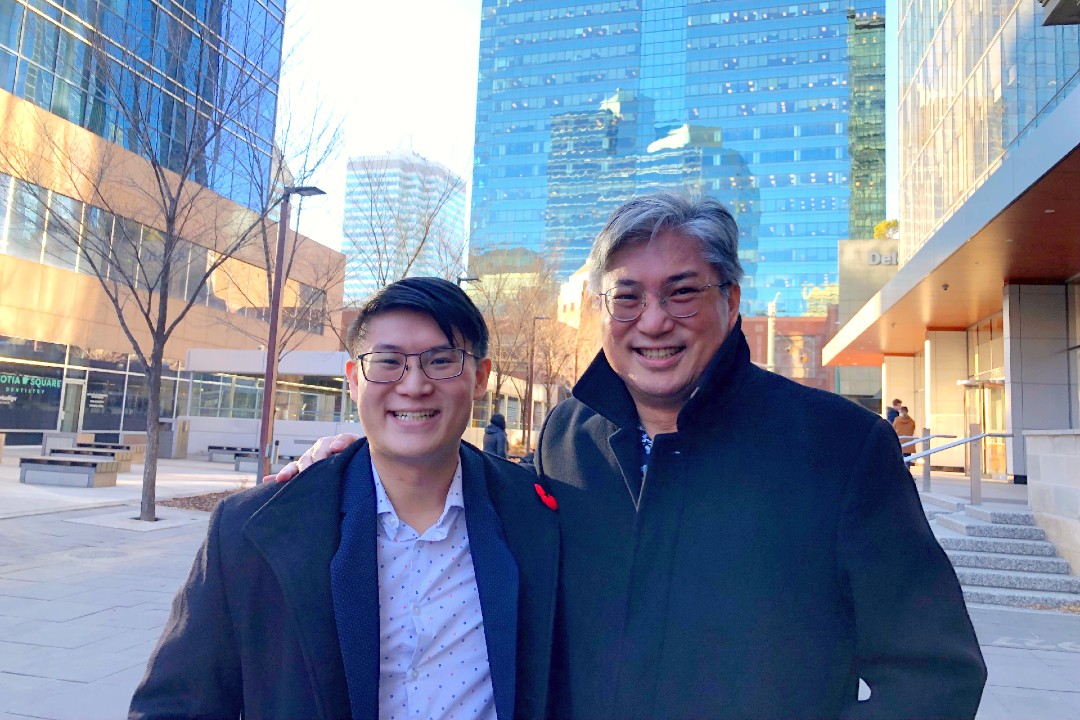Converting empty downtown office spaces into places to live has been a hot topic in recent months, but TrustBIX dreams of filling Edmonton's former cubicle farms with fruits and veggies.
The company is in talks with prospective landlords to install vertical farms in downtown office space. TrustBIX representatives say it's their effort to improve downtown vibrancy and food security at the same time.
"Having indoor farms here, growing food here, and feeding people out of here would be one of those things that we can do to address people, address food, and address the empty space," TrustBIX CEO Hubert Lau told Taproot.
Joshua Lau, business analyst for TrustBIX and Hubert Lau's son, said the company hopes to start growing produce for restaurants in Chinatown before expanding to local grocery stores.
"We're looking at gai lan, which is Chinese broccoli, choy sum, lots of vegetables, herbs, and spices," Joshua Lau said. "We've been looking at growing Chinese ginger as well, because of the health benefits, and having a local source of it would be huge."
Downtown Edmonton office buildings definitely have space for new tenants. The vacancy rate for office space downtown is 24.2%, considerably higher than the national average of 18.9%, according to CBRE's third quarter report.
Hubert Lau said renovating an office space could cost roughly $25 per square foot. Contractors would ideally remove walls and carpets. The site would need a space for employees to change from their street clothes. For water to feed the plants, the operation would use PVC pipes and power for lights would be supplied through network cables.
"It's very conducive to an office environment with minimal effect to the building, so it's quite rentable after we leave as well," he said.

Joshua and Hubert Lau of TrustBIX are in talks with potential landlords to convert empty downtown office space into vertical indoor farms. (Stephanie Swensrude)
TrustBIX has acquired the Alberta arm of AgriPlay, meaning it holds the exclusive Alberta territory licence to operate AgriPlay's vertical farming technology. AgriPlay, based in Calgary, was founded in 2021 and has built a proprietary system that it claims can grow more than 150 crops and use less energy than traditional vertical-farming techniques.
Joshua Lau said the AgriPlay technology uses less water and electricity than human beings in the same office space.
"We're using LED lights and stripping out the five exact wavelengths that plants need, so it helps to bring down the electrical costs and the heat generation, which also prevents the humidity build-up from the plant sweating," he said. "Because of that, we're able to actually keep the (room at) room temperature."
Joshua Lau added the best places for the vertical farms to lease are the "hard-to-rent" ones — windowless spaces by the mechanical room, basements, and rooms next to the loading dock. For example, AgriPlay installed a farm in the basement of Calgary Tower in 2022.
Hubert Lau said a full installation, including renovations, would run about $150 to $250 per square foot
But while investors view traditional options like office and residential uses as stable real-estate investments, indoor farming can be riskier.
Hubert Lau acknowledges that. "I will not debate anybody when they say it's not secure, because traditionally, (indoor farming) doesn't make sense," he said. "We didn't get into indoor farming for a long time because of that, because every time we looked at it didn't make sense."
Still, he said AgriPlay is different. The upfront investment required is lower — less than $1 million compared to tens of millions — and the plan is to start smaller, by selling to local companies instead of trying to compete at big-box stores.
Vertical farms are not a silver bullet to solve downtown's vibrancy challenges or food security, said Lisa Baroldi, president of Building Owners and Managers Association Edmonton. But Baroldi said it's nonetheless important for the city to better support occupying these downtown spaces with new tenants.
"I'm not sure that filling towers with farms addresses necessarily the vibrancy side of it because you're effectively transforming spaces for people into spaces for plants," Baroldi said. "But I think that building owners should have the freedom to transform their buildings into whatever they see fit and that incentives ought to be in place and support in place for the types of conversions that address (downtown vibrancy and food security)."
Edmonton city council doesn't offer incentives to convert office space to other uses but is considering using the downtown community revitalization levy to incentivize office-to-residential conversions. The City of Calgary has a well-subscribed incentive program that offers about $75 per square foot to convert office space into housing, hotels, post-secondary uses, and performance spaces.
"I think we need to just be more open here and understand that there are a lot of different options for spaces when something is not purpose-built," Baroldi said. "It's difficult, no question, but there are companies that have the technologies and are sophisticated enough to transform these spaces."
TrustBIX's main business is collecting and verifying data about food on its journey through the supply chain. For its work on vertical farms, Hubert Lau said the company is waiting to finalize financing models and contracts with potential landlords and hopes to harvest crops and money from downtown vertical farms within the first few months after they get started.
